Tense Forms (Active)
|
Simple
(Indefinite)
|
Perfect
|
Continuous (Progressive)
|
Perfect Continuous
|
Future
|
I shall write...
Will you write..?
Yes, I shall.
No, I shall not
(shan’t).
|
tomorrow,
the day after tomorrow,
next week,
in two weeks (months, yeas),
in 2035
|
I shall have written…
Will you have
written…?
Yes, I shall.
No, I shall not
(shan’t).
|
by 5 tomorrow,
before you come
|
I shall be writing…
Will you be writing…?
Yes, I shall.
No, I shall not (shan’t).
|
at 5 tomorrow,
from 5 till 7 tomorrow,
when you come
|
I shall have been writing…
Will you have
been writing…?
Yes, I shall.
No, I shall not (shan’t).
|
for
|
|
I, II; shall/will+I
|
to have + III
|
to be+ IV
|
to have been+ IV
|
Present
|
I write…
Do you write…?
Yes, I do.
No, I don’t.
He writes…
Does he write…?
Yes, he does.
No, he does not (doesn’t).
|
usually, often, always, sometimes, seldom,
never,
every day (week, month, year)
|
I have written…
Have you written…?
Yes, I have.
No, I have not
(haven’t).
|
-[result];
already, just,
yet, never, ever, not yet, today, this week (month, year);
lately, before,
since, for
|
I am writing…
Are you writing...?
Yes, I am.
No, I am not.
|
now
|
I have been writing…
Have you been writing…?
Yes, I have.
No I have not (haven’t).
|
Since,
for;
these two days
|
Past
|
I wrote…
Did you write…?
Yes, I did.
No, I did not
(didn’t).
|
yesterday,
the other day,
the day before
yesterday,
last week (month, year),
2 days (weeks, years) ago,
in 1917
|
I had written…
Had you
written…?
Yes, I had.
No, I had not
(hadn’t).
|
by 5 yesterday,
before you came
|
I was writing…
Were you writing..?
Yes, I was.
No, I was not
(wasn’t).
|
at 5 yesterday,
from 5 till 7 yesterday,
when you came
|
I had been writing…
Had you been writing…?
Yes, I had.
No, I had hot (hadn’t).
|
Since,
for
|
Tense Forms (The Passive Voice)
|
Simple (Indefinite)
|
Perfect
|
Continuous (Progressive)
|
Perfect Continuous
|
Future
|
This letter will be written...
Will thi letter be written..?
Yes, it will.
No, it will not.
(won’t).
|
tomorrow,
the day after tomorrow,
next week,
in two weeks (months, yeas),
in 2025
|
This letter will have been written…
Will this letter have been
written…?
Yes, it will.
No, it will not
(won’t).
|
by 5 tomorrow,
before you come
|
-
|
|
-
|
|
|
to be + III
|
to be + III
|
to be+ III
|
|
Present
|
Such a letter is written…
Is such a letter written…?
Yes, it is.
No, it is not
(isn’t).
|
usually, often, always, sometimes, seldom,
never,
every day (week, month, year)
|
This letter has been written…
Has this letter been written…?
Yes, it has.
No, it has not (hasn’t).
|
[result];
already, just,
yet, never, ever, not yet, today, this week (month, year),
lately, before,
since, for
|
Such a letter is being written…
Is such a letter being written?
Yes, it is.
No, it is not (isn’t).
|
now
|
-
|
|
Past
|
This letter was written
Was this letter written…?
Yes, it was.
No, it wasn’t
|
Yesterday, the day before yesterday; last week(month,year)
two days (weeks, months, years) ago,
in 1985
|
This letter had been written
Had this letter been written…?
Yes, it had.
No, it hadn’t.
|
by 5 yesterday;
before you came
|
This letter was being written
Was this letter being written…?
Yes, it was.
No, it wasn’t.
|
at 5 yesterday;
when you came
|
-
|
|
The Modal Verbs
MODALS
|
USAGE
|
Examples
|
can/could
|
to describe ability
|
My friend can dance well.
I can explain this rule to you.
|
may/might
|
to describe permission
|
You may take my book.
|
must
|
to describe a necessary action
|
You must keep this door locked.
|
to give someone an order
|
You must be careful when you drive.
|
to describe a duty
|
Everyone must recycle as much as possible.
|
to make a strong recommendation
|
You really must go and see that.
|
to emphasize an intention
|
I must lend you this book.
|
for formal questions
|
Must you go?
|
should
|
to make a recommendation when we say what we think is a good idea
|
You should come to work by metro. It would be much quicker.
|
ought to
|
to say what we think is correct thing to do
|
I think you ought to go to the doctor. You look not so good.
|
need
|
to describe a necessary action
|
You need to be more attentive.
|
can’t have +III
couldn’t have + III
|
when we are certain that sth in the past was possible;
when we are sure sth wasn’t true
|
She can’t / couldn’t have taken the car. She didn’t have the keys.
That can’t have been successful (I’m sure it wasn’t).
|
may have + III
|
for possible events in the past
|
He isn’t here. He may/might have been late.
|
must have + III
|
when we are certain sth in the past was true
|
I cannot find my purse. I must have left it at home.
|
MODALS
|
USAGE
|
Examples
|
should have + III
|
when we describe what we expect has probably happened, or believe has failed to happen
|
They should have arrived in Moscow by now.
|
ought to have + III
|
The train ought to have arrived. Where is it? (It hasn’t arrived.)
|
needn’t have + III
|
to describe a past situation where sth happened or was done, but wasn’t necessary
|
I needn’t have gone to the office. The meeting was postponed.
|
The Equivalents of the Modals
Modals-
|
Equivalents
|
Usage
|
Examples
|
can/could
|
To be able to
|
to emphasize that a difficulty has been overcome
|
She can’t come to the party, but she is able to get in touch by Skype.
|
to make the description of ability more definite
|
He’ll be able to finish his course paper next week.
|
may/might
|
To be allowed to
|
to describe permission
|
You are to stay in bed until you are allowed to get up.
|
must
|
to be to
|
a formal way of saying must in instruction
|
All the students are to be at the exam at 9.
|
to have to
|
for a necessary action
|
We have to go faster. It’s going to rain.
|
Participle I
|
Active
|
Passive
|
Indefinite
|
writing
|
being written
|
Perfect
|
having written
|
having been written
|
The Syntactic Functions of Participle I
|
Subject
|
Predicate
|
Object
|
Adverbial Modifier
|
0
|
1
|
2
|
3
|
4
|
Opening the door
|
he
|
went out.
|
|
|
|
The students
|
are writing
|
a test
|
at the moment.
|
|
The boy
|
was silent
|
|
looking seriously.
|
A reading girl - attribute
The girl reading a book…- attribute
The Objective Participial Construction
Subject
|
Predicate
|
Object
|
1
|
2
|
3
|
I
|
see
|
them (her,him) working on the computer.
|
The Subjective Participial Construction
Subject
|
Predicate
|
1
|
2
|
He
|
is seen coming.
|
Participle II
The Syntactic Functions of Participle II
The locked door - attribute
The method used by the scientists…- attribute
|
Subject
|
Predicate
|
Object
|
Adverbial Modifier
|
0
|
1
|
2
|
3
|
4
|
When asked
|
he
|
gave
|
the right answer.
|
|
|
The door
|
was locked
|
by the owner of the house.
|
|
|
He
|
shook
|
his head
|
as though ashamed.
|
The Infinitive
|
Active
|
Passive
|
Indefinite
|
to write
|
to be written
|
Continuous
|
to be writing
|
-
|
Perfect
|
to have written
|
to have been written
|
Perfect Continuous
|
to have been writing
|
-
|
The Syntactic Functions of the Infinitive
|
Subject
|
Predicate
|
Object
|
Adverbial Modifier
|
0
|
1
|
2
|
3
|
4
|
|
To swim
|
Is usefull.
|
|
|
|
Our aim
You
We
They
|
is to master
can do
may go
must do
|
English.
this work.
this task.
|
there.
|
To arrive in time
|
we
|
took
|
a taxi.
|
|
|
We
|
went
|
|
to the US to practice English
|
The Objective with the Infinitive Construction
Subject
1
|
Predicate
2
|
Object
3
|
I
|
want/ wish/ would like
|
you(her, him, them) to read the text aloud.
|
He
|
made/ let
|
them do it.
|
I
|
hear/ see/ watch
|
the children play in the room.
|
The Subjective Infinitive Construction
Subject
1
|
Predicate
2
|
He
|
is/ was said to arrive.
|
is/ was reported to arrive.
|
is/ was stated to arrive.
|
is/ was expected to arrive.
|
is/ was likely to arrive.
|
is/ was unlikely to arrive.
|
seems to arrive.
|
The for-to-Infinitive Construction
Subject
|
Predicate
|
Object
|
Adverbial Modifier
|
It
|
is necessary
|
for them to do the work
|
today.
|
The Gerund
|
Active
|
Passive
|
Indefinite
|
writing
|
being written
|
Perfect
|
having written
|
having been written
|
The Syntactic Functions of the Gerund
0
|
Subject
1
|
Predicate
2
|
Object
3
|
Adverbial Modifier
4
|
|
Reading
|
is my hobby.
|
|
|
|
My hobby
|
is reading.
|
|
|
We
|
intend going
|
|
to the US.
|
|
I
|
like
|
making people happy.
|
|
Before crossing the road
|
he
|
stopped and looked at us.
|
|
|
|
He
|
went away
|
|
without looking at us.
|
He was born with the gift of winning hearts. – attribute
Compare:
a reading girl ( Participle I) - a reading hall ( Gerund)
a sleeping boy ( Participle I ) – a sleeping car (Gerund)
The Conditionals
TYPES of CONDITION
|
Subordinate Clause
|
Main Clause
|
I - Real Condition
(First Conditional)
|
If I know her address,
|
I will write to her.
|
II -Unreal condition
(today/tomorrow)
(Second Conditional)
|
If I knew her address
|
I would write to her.
|
III -Unreal Condition
(yesterday)
(Third Conditional)
|
If I had known her address
|
I would have written to her.
|
WORD-BUILDING
MODELS OF BUILDING
NOUNS
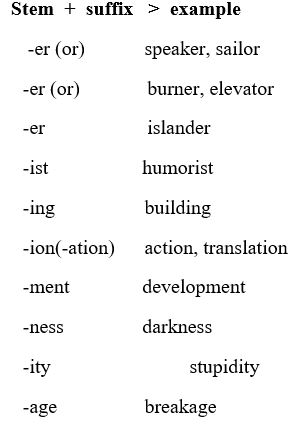
ADJECTIVES
Stem + suffix > adjective
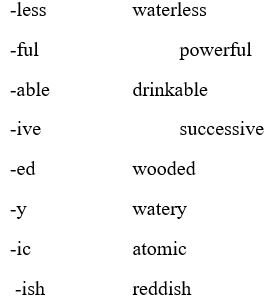
Prefix + stem > adjective
Un- unimportant
Im-/-in/-ir impure/ incorrect/ illegal
VERBS
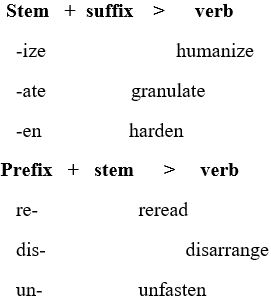
CONVERSION
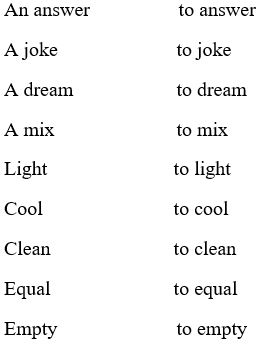
COMPOUND WORDS
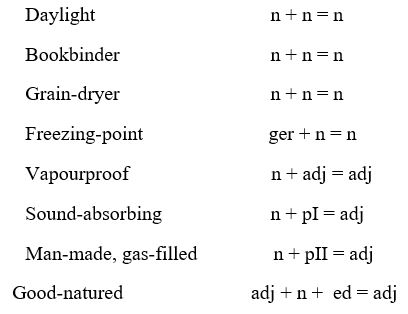
Понимание иностранного текста достигается двумя видами чтения: изучающего и просмотрового. Изучающее чтение предназначено для самостоятельного лексико-грамматического анализа с использованием знаний тех специализаций, которыми располагает ГБОУ ВО МО «Технологический университет». Необходимо точно воспроизвести текст на русском языке.
Для перевода текста необходимо: знать незнакомые слова с учетом словообразовательных признаков; различать интернациональные слова и знать их значение; владеть грамматическими формами и конструкциями и грамотно перевести их на русский язык, использовать в тексте иллюстрированный материал, схемы, формулы, если такие имеются, применить знания тех специализаций, которые присутствуют в тексте. Для адекватного перевода необходимо использовать отраслевые, терминологические словари, словари сокращений по специальностям.
VI. Выполнение контрольных заданий и оформление контрольных работ
1. Количество контрольных заданий устанавливается в соответствии с учебным планом учебным планом соответствующего направления подготовки университета. График выполнения контрольных работ устанавливается преподавателем.
2. Каждое контрольное задание представлено в виде пяти вариантов. Обучающемуся необходимо выполнить один из пяти вариантов предложенных контрольных работ.
3. Структура контрольной работы имеет следующие основные элементы: титульный лист, основную часть, словарь. На обложке обязательно указываются фамилия, имя, отчество, номер контрольной работы, полное наименование университета (без сокращений), наименование института, кафедры, а также номер группы. Рекомендуется установить широкие поля, чтобы преподаватель вносил замечания, объяснения и методические указания.
4. Объём контрольной работы должен составлять до 10 страниц формата А4, напечатанного с одной стороны текста (1,5 интервал, шрифт 14 Times New Roman, поля широкие).
Образец расположения материала контрольной работы:
Левая страница Правая страница
Поля
|
Английский текст
|
Русский текст
|
Поля
|
5. Контрольные работы выполняются в той последовательности, в которой они располагаются в данном сборнике.
6. Выделяются один или два абзаца для проверки умения читать без словаря в каждом контрольном задании. Обучающийся должен продемонстрировать понимание основной мысли, изложенной в абзаце. После текста дается контрольный вопрос, отражающий насколько точно и правильно обучающийся понял осную мысль, представленную в абзаце (абзацах). После данного вопроса предлагается несколько вариантов ответа, среди которых необходимо выбрать наиболее четко отражает основную мысль ответ.
7. Выполненные контрольные работы необходимо сдать преподавателю в печатном виде на проверку в установленные сроки (даты зачёта и экзамена).
8. Если контрольная работа выполнена без соблюдения указаний или не полностью, она возвращается без проверки.
VII. Исправление работы на основе рецензии
1. При возвращении обучающемуся проверенную контрольную работу от рецензента, необходимо внимательно ознакомиться и проанализировать все замечания и ошибки, которые содержаться в работе.
2. Ориентируясь на замечания рецензента, повторно поработайте с учебным материалом. Необходимо переписать заново все исправленные предложения, в которых были ошибки, в конце работы.
3. Только после того, как обучающийся выполнит все указания рецензента и исправит все ошибки, он может приступить к изучению материала нового контрольного задания.
4. Проверенные контрольные работы являются учебными документами, которые нужно обязательно сохранять. Необходимо помнить, что во время зачета или экзамена производится проверка усвоения материала, вошедшего в контрольные работы.
VIII. Письменные консультации
При возникновении трудностей при самостоятельном изучении английского языка необходимо сообщить об этом своему преподавателю лично или в электронном виде, четко сформулировав вопрос, например: а) что для вас вызвало наибольшие затруднения при работе с текстом; б) какой грамматический раздел вам не понятен и какие правила наиболее неясны; в) с какими упражнениями работать наиболее сложно и что представляет для вас основные затруднения.
Также необходимо указать название учебника, учебного пособия, рабочей тетради или сборника, по которому проходят занятия, его год издания, страница, номер упражнения.
IX. Подготовка к зачетам и экзаменам
Основные рекомендации при подготовке к зачетам и экзаменам:
а) прочитайте повторно и переведите наиболее сложные тексты; б) просмотрите материал проверенных контрольных работ; в) проделайте выборочно отдельные упражнения для самопроверки; г) повторите материал для устных упражнений.
|
 Скачать 1.02 Mb.
Скачать 1.02 Mb.




